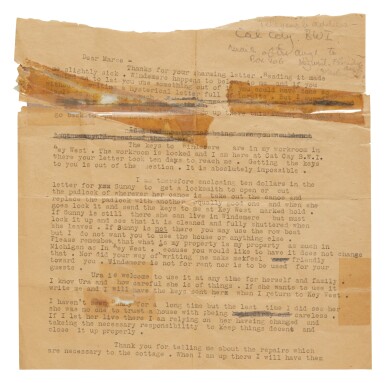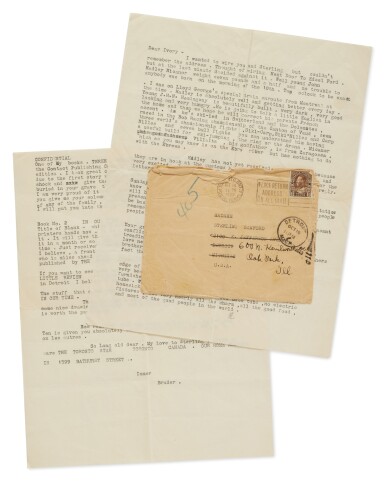HEMINGWAY, Ernest (1899-1961). Six typed letters signed ('Ernest Hemingway' or 'Ernesto'), two with autograph annotations, one autograph note signed, and four cables, to Ernesto Durán, Havana, Finca Vigía, Sun Valley and n.p., 10 May 1939 - 7 November 1941 and n.d., partly in Spanish , showing in very warm terms his feelings for Durán, hoping that he will be able to get to the United States, expressing his thanks that Durán read and corrected the proofs of For whom the Bell tolls , 'to correct my in-existant Spanish', and his relief at receiving them, 'I read your corrections on the boat. Eevery ( sic ) one was just and right and you should have made more. I read your notas which were excellent. (Two mistakes) I thought: "There is no letter. There is no answer to my letter. Therefore Gustavo judges the book to be shit and that is o.k. I have wasted 12 years and two movimientos and one war and I have written shit ... Vamos al dejarlo (wrong idiom but that is the idea) and I must write a good book the next time if possible', expressing his displeasure with interviewers, explaining his use of certain words, giving news of mutual friends and acquantances, 'Lister and Modesto moved into Poland and then Passionaria took Finland, and reminiscing about the past, 'Excuse all this crap Gustavo. It is that one gets lonesome to talk about old times when everything was good and straight forward and simple', mentioning the forthcoming film of the book starring Gary Cooper, and Durán's cooperation in it, and apologising for the frustrations over delays in its production, 16 pages, 4to and 8vo ; together with two typed envelope covers, a typed letter signed from Maxwell Perkins of Scribners about the proofs of the book, and the review from The New York Times Book Review of 11 August 1940. An expressive, apparently unpublished, series of letters from the author to one of his hero figures, Gustavo Durán (1906-1969), whom Hemingway had met in Paris in 1929 and again in Spain in 1937, and whose military prowess, remarkable for a musician, had inspired him to include Durán as one of the authentic characters in For whom the Bell tolls . Hemingway's admiration and friendship for Durán is strongly expressed in these letters, in the first sending money and his hopes for the future. On 13 August [1940] he announces that the proofs of the book will be sent by Max Perkins of Scribners adding 'I have no right to write of Spain, nor Spaniards, nor the movement, not the war', worrying what Gustavo will think of it but stating 'I can write better about Spain than Merrimmee ( sic ) and Gautier'. In the undated letter on receiving the corrected proofs he attempts to write in Spanish, explaining why he wanted a Spaniard to do the corrections, and expressing understanding if he thought the work too bad. He qualifies the use of certain expressions while trying to convey the exact meaning in translation, 'most of these corruptions I get from Basques who really do not know Spanish any more than I do', and expresses his love for the country, referring to an ancestor, who fought in Spain under Wellington during the Peninsular War. On 5 March 1940 Hemingway explains why the book is so long, 'Then Marta had to go to Finland for Colliers. My book kept getting longer and longer and now it is so god-damned long that it is terrific', referring to his political opinions, and hoping that the censor will not object to certain witticisms and the use of vulgar expressions, also giving news of his domestic life, contact with old friends, and his social life in Cuba. In a cable of 4 November 1941 and letter of 6 November he expresses his frustration during the negotiations over the filming of the book, using intemporate language over Hollywood's attitude toward him as a Communist, the letter enclosing a cheque for $1,000 to cover wasted expenses. Hemingway hero-worshipped the former musician and fighting commander in the Spanish Civil War, who had fled on Franco's victory to
HEMINGWAY, Ernest (1899-1961). Six typed letters signed ('Ernest Hemingway' or 'Ernesto'), two with autograph annotations, one autograph note signed, and four cables, to Ernesto Durán, Havana, Finca Vigía, Sun Valley and n.p., 10 May 1939 - 7 November 1941 and n.d., partly in Spanish , showing in very warm terms his feelings for Durán, hoping that he will be able to get to the United States, expressing his thanks that Durán read and corrected the proofs of For whom the Bell tolls , 'to correct my in-existant Spanish', and his relief at receiving them, 'I read your corrections on the boat. Eevery ( sic ) one was just and right and you should have made more. I read your notas which were excellent. (Two mistakes) I thought: "There is no letter. There is no answer to my letter. Therefore Gustavo judges the book to be shit and that is o.k. I have wasted 12 years and two movimientos and one war and I have written shit ... Vamos al dejarlo (wrong idiom but that is the idea) and I must write a good book the next time if possible', expressing his displeasure with interviewers, explaining his use of certain words, giving news of mutual friends and acquantances, 'Lister and Modesto moved into Poland and then Passionaria took Finland, and reminiscing about the past, 'Excuse all this crap Gustavo. It is that one gets lonesome to talk about old times when everything was good and straight forward and simple', mentioning the forthcoming film of the book starring Gary Cooper, and Durán's cooperation in it, and apologising for the frustrations over delays in its production, 16 pages, 4to and 8vo ; together with two typed envelope covers, a typed letter signed from Maxwell Perkins of Scribners about the proofs of the book, and the review from The New York Times Book Review of 11 August 1940. An expressive, apparently unpublished, series of letters from the author to one of his hero figures, Gustavo Durán (1906-1969), whom Hemingway had met in Paris in 1929 and again in Spain in 1937, and whose military prowess, remarkable for a musician, had inspired him to include Durán as one of the authentic characters in For whom the Bell tolls . Hemingway's admiration and friendship for Durán is strongly expressed in these letters, in the first sending money and his hopes for the future. On 13 August [1940] he announces that the proofs of the book will be sent by Max Perkins of Scribners adding 'I have no right to write of Spain, nor Spaniards, nor the movement, not the war', worrying what Gustavo will think of it but stating 'I can write better about Spain than Merrimmee ( sic ) and Gautier'. In the undated letter on receiving the corrected proofs he attempts to write in Spanish, explaining why he wanted a Spaniard to do the corrections, and expressing understanding if he thought the work too bad. He qualifies the use of certain expressions while trying to convey the exact meaning in translation, 'most of these corruptions I get from Basques who really do not know Spanish any more than I do', and expresses his love for the country, referring to an ancestor, who fought in Spain under Wellington during the Peninsular War. On 5 March 1940 Hemingway explains why the book is so long, 'Then Marta had to go to Finland for Colliers. My book kept getting longer and longer and now it is so god-damned long that it is terrific', referring to his political opinions, and hoping that the censor will not object to certain witticisms and the use of vulgar expressions, also giving news of his domestic life, contact with old friends, and his social life in Cuba. In a cable of 4 November 1941 and letter of 6 November he expresses his frustration during the negotiations over the filming of the book, using intemporate language over Hollywood's attitude toward him as a Communist, the letter enclosing a cheque for $1,000 to cover wasted expenses. Hemingway hero-worshipped the former musician and fighting commander in the Spanish Civil War, who had fled on Franco's victory to














.jpg)
Try LotSearch and its premium features for 7 days - without any costs!
Be notified automatically about new items in upcoming auctions.
Create an alert